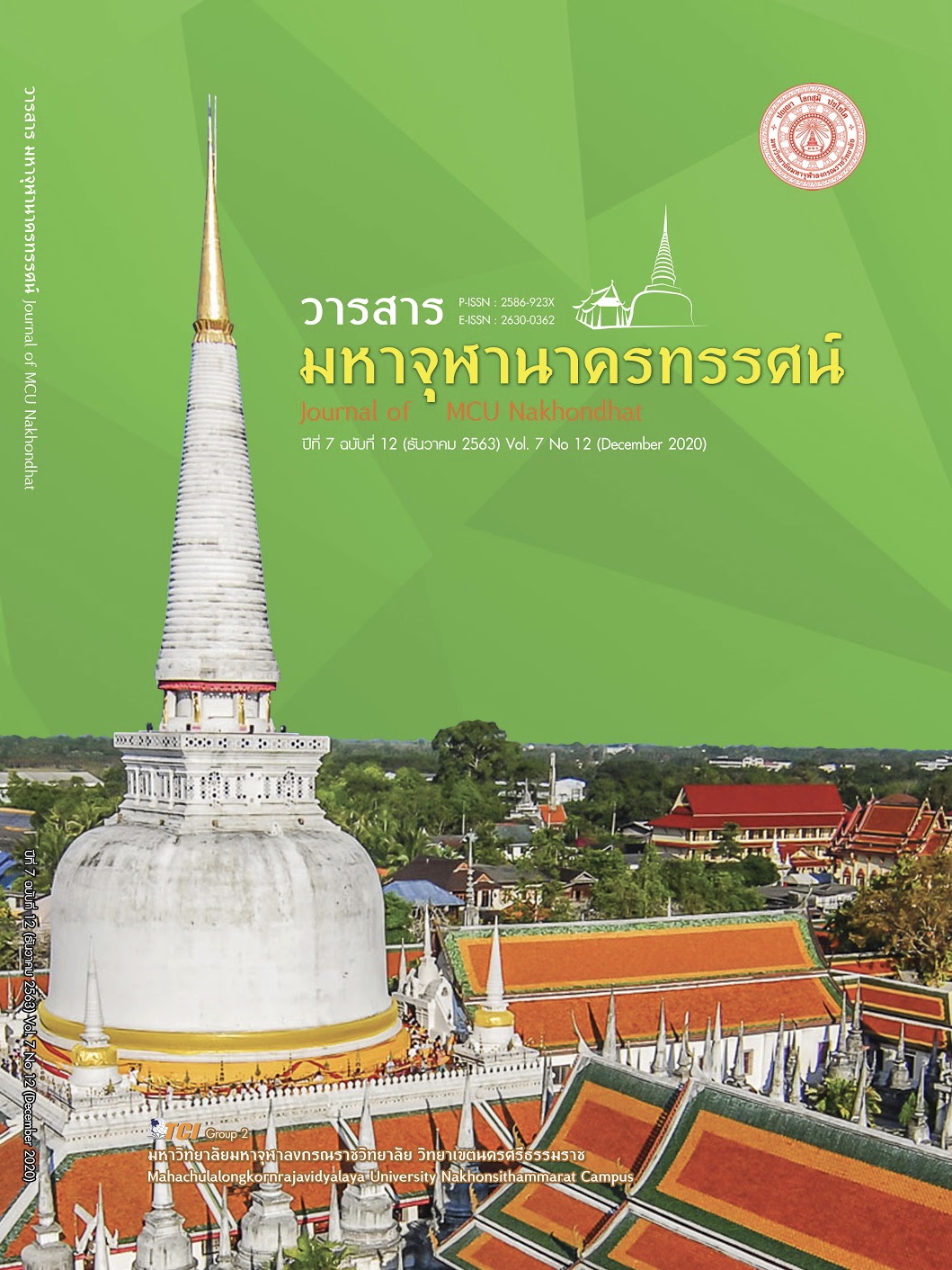THE EXPECTATIONS OF SANGHA FOR SANGHA EDUCATION MANAGEMENT BAN TA KHUN DISTRICT SURATTHANI PROVINCE
Main Article Content
Abstract
The objective of this research paper is 1) to study the expectations of the monks 2) to compare the expectations of the monks 3) to find recommendations on solving problems and obstacles arising to the management of the Sangha education. Ban Ta Khun District Suratthani Province It is a quantitative research. There are 4 areas of learning management content: 1) learner quality 2) management 3) learner - centered instructional management 4) supporting factors The key information contributors were 37 monks in Ban Ta Khun district. The tool used was questionnaires. The questionnaire's confidence was 0.94. The data was analyzed using basic statistics, ie mean, standard deviation. And the one - way variance The results of the research revealed that 1) the monks had high expectations for the educational management of the Sangha. Overall, they were at a high level in all aspects, including the quality of the learners. In the management of teaching and learning with a focus on students Management And supporting factors 2) the results of comparison of the expectations of the monks Classified by personal factors Not all differences were significantly different at a statistically significant level of 0.05 3) Recommendation The Sangha should cooperate with the public and private sectors to promote a campaign to promote the public interest in matriculation. And provide training for the newly ordained Lord Buddha to have more knowledge The administrative priests should encourage personnel to attend undergraduate studies. To know the principles of management Instructional curriculum focuses too much on textbooks. The Sangha should organize training to increase the potential of the teachers. Insufficient budget, increasing personnel, modern teaching equipment The Sangha should cooperate with the public and private sectors to find a budget.
Article Details
References
พระครูธรรมธรสายัณห์ ฐิตปุญฺโญ. (2558). การบริหารจัดการในการเรียนการสอนธรรมศึกษาของโรงเรียนมัธยมศึกษาในกรุงเทพมหานครและสมุทรปราการ. ใน ดุษฎีนิพนธ์พุทธศาสตรดุษฎีบัณฑิต สาขาวิชาการจัดการเชิงพุทธ . มหาวิทยาลัยมหาจุฬาลงกรณราชวิทยาลัย.
พระครูปริยัตยานุกูล ฐิตสีโล (มีสุข). (2557). บทบาทของคณะสงฆ์ที่มีต่อการบริหารจัดการการศึกษาพระปริยัติธรรม เขตบางคอแหลม เขตยานนาวา และเขตสาทร กรุงเทพมหานคร. ใน วิทยานิพนธ์พุทธศาสตรมหาบัณฑิต สาขาวิชาการบริหารการศึกษา. มหาวิทยาลัยมหาจุฬาลงกรณราชวิทยาลัย.
พระมหากังวาล ธีรธมฺโม. (2560). ประสิทธิภาพการจัดการการศึกษาธรรมศึกษาในโรงเรียนมัธยมศึกษาใน อำเภอหัวหิน จังหวัดประจวบคีรีขันธ์. ใน สารนิพนธ์พุทธศาสตรมหาบัณฑิต สาขาวิชาการจัดการเชิงพุทธ. มหาวิทยาลัยมหาจุฬาลงกรณราชวิทยาลัย.
พระมหาญัตติพงษ์ เลิศศรี. (2553). สภาพและปัญหาการจัดการเรียนการสอนพระปริยัติธรรมแผนกบาลี ของสำนักศาสนศึกษาในจังหวัดนครสวรรค์. ใน สารนิพนธ์การศึกษามหาบัณฑิต สาขาวิชาการบริหารสถานศึกษา. มหาวิทยาลัยนเรศวร.
พระมหาอิศเรศ ธมฺมวโร. (2559). การพัฒนาการศึกษาสงฆ์ในศตวรรษที่ 21. วารสารครุศาสตร์ปริทรรศน์ฯ, 3(1), 124-136.
ศรัญญู ยอดสุรางค์. (2562). สถิติประชากรจากทะเบียนบ้านฯ พฤศจิกายน พ.ศ. 2562. สุราษฎร์ธานี: สำนักทะเบียน อำเภอบ้านตาขุน.
สถิต ต้นหอม. (2559). การศึกษาสภาพจริงและความคาดหวังของผู้ปกครองที่มีต่อสมรรถนะสำคัญของผู้เรียน โรงเรียนวัดแหลมฉบัง สังกัดสำนักงานเขตพื้นที่การศึกษาประถมศึกษาชลบุรี เขต 3. ใน วิทยานิพนธ์การศึกษามหาบัณฑิต สาขาวิชาการบริหารการศึกษา. มหาวิทยาลัยบูรพา.
สำนักงานเจ้าคณะตำบลเขาวง. (2562). บัญชี พระภิกษุ สามเณร ศิษย์วัด ชี (นอกพรรษากาล) ประจำปี พ.ศ. 2562. สุราษฎร์ธานี: สำนักงานเจ้าคณะตำบลเขาวง.
อเนก ขำทอง. (2552). คู่มือธรรมศึกษา. กรุงเทพมหานคร: โรงพิมพ์ชุมนุมสหกรณ์การเกษตรแห่งประเทศไทยจำกัด.
อุไรลักษณ์ ไชยนุวัติ. (2551). ความคาดหวังของผู้ปกครองต่อการจัดการศึกษาระดับปฐมวัยของโรงเรียนสังกัดสำนักงานเขตพื้นที่การศึกษานนทบุรี เขต 1 จังหวัดนนทบุรี. ใน วิทยานิพนธ์การศึกษามหาบัณฑิต สาขาการบริหารการศึกษาคณะศึกษาศาสตร์. มหาวิทยาลัยรังสิต.


